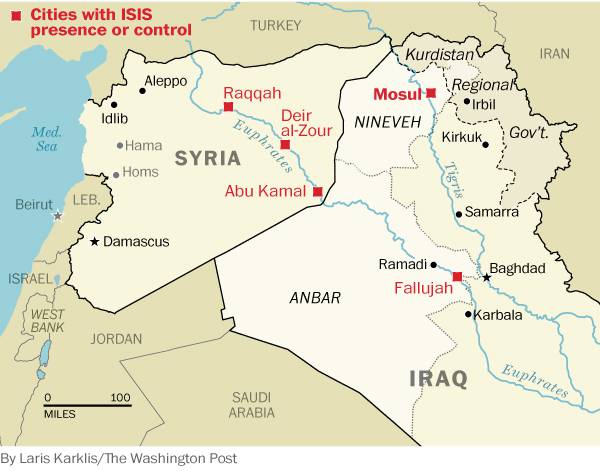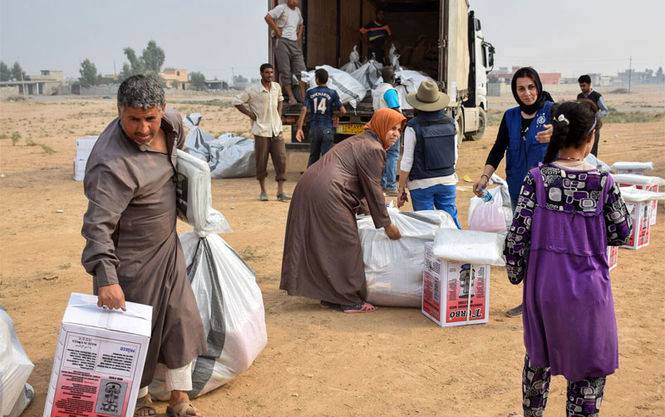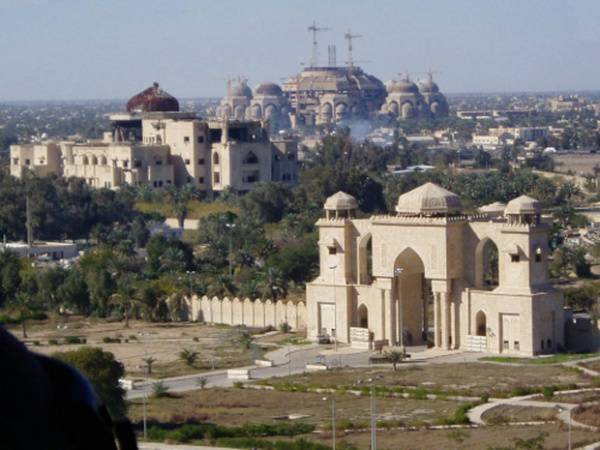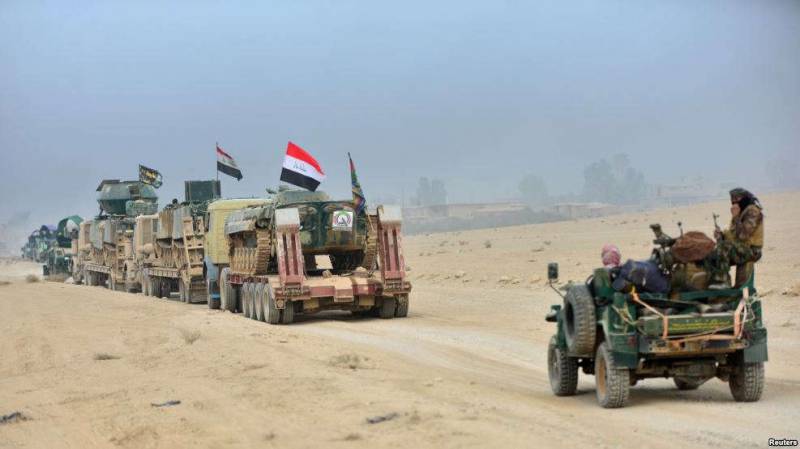The affliction of Mosul. Fighting continues for the ancient city
Mosul is one of the oldest cities in the Middle East with a very rich history. The city called Mepsila was first mentioned by the famous ancient Greek historian Xenophon in 401 BC. True, the speech in the memoirs of Xenophon was about the "old Mosul", located in 30 km. north of the modern city. In the early years of our era, in Mosul, inhabited by the Assyrians, Christianity began to spread. In the VI. AD in the city, the residence of the bishop of the Nestorian church was opened, but already in the VII century (in 637 or 641) the city was seized by the Arab caliphate. It has retained its status as an important shopping and cultural center. Islamization of the population of Mosul gradually took place, although a significant part of the city’s population was still Christians. The medieval history of Mosul is a constant transition of the city from one ruler to another. Mosul was controlled by the Abbasids, Hamdanids, Ukylids, in the XI century the city was conquered by the Seljuk Turks, then became the center of the Zangid dynasty, and in the XIII century it was captured by the Mongols and was part of the Ilkhanid and Jalairid states. At the very beginning of the 16th century, Mosul was part of the Turkmen state of Ak-Koyunlu for some time, and in 1508 it was conquered by the army of the Persian Safavid dynasty.
However, already in 1535, the Ottoman Empire, which had managed to prevail over the Sefevids in Iraq, annexed Mosul to its possessions. For almost four centuries, the city became the center of the Ottoman empire of the same name, which was, incidentally, considered one of the richest and most independent in Mesopotamia. Despite the fact that from the 7th century Mosul was part of the Muslim states, there remained a large Christian population, primarily Assyrian by ethnicity. The Christians of Mosul were greatly influenced by Dominican missionaries who arrived in the city in 1750 and discovered their mission here. Catholic missionaries patronized local Assyrian communities.

In 1918, after the defeat of the Ottoman Empire in World War I, Mosul was occupied by British troops, and in 1926 an agreement was signed between Great Britain and Turkey, according to which Mosul was recognized as a city within Iraq, and the former Ottoman viliter Mosul became an Iraqi province Ninawa. In the mid-twentieth century, Mosul turned into an important oil transportation point from Iraq to Syria and Turkey. The regime of Saddam Hussein pursued a deliberate policy on the "Arabization" of Mosul and the province of Ninawa, although the repressive actions of Saddam Hussein related primarily to the Kurds. Christians - Arabs and Assyrians, as well as Yezidis, were not touched during the years of the rule of Saddam Hussein, since they were not considered as opponents of the regime.
By the beginning of the 2000's. 1,8 million lived in Mosul. Most of the townspeople were Sunni Arabs, whose quarters were located on the west bank of the Tigris River. The eastern bank of the river consisted of quarters of numerous national minorities. Despite the predominance of the Arab-Sunni population, Mosul remained an extremely multiethnic and multi-religious city. It was inhabited by Assyrians - followers of Nestorianism, Arabs - Christians (Haldo-Catholics and Jacobites), Armenians, Yezidis, Kurds, Turkomans, Jews - Jews, Mandaeans (the ancient ethno-religious group of the “disciples of John the Baptist”) and Shabak (Iranian-speaking ethnoconfessional)
When the US invasion of Iraq began in 2003, Mosul became an important target of attack by American forces. 11 April 2003 The 5 th Iraqi Army Corps defending Mosul liberated the city. 22 July 2003 was precisely in Mosul, in a shootout with coalition soldiers, the sons of Saddam Hussein - Uday and Qusay were killed. However, even after the fall of the regime of Saddam Hussein, the situation in Mosul remained far from calm. So, 24 June 2004, there was a grand terrorist attack. As a result of the car bombing, 62 people died. In the suburbs of Mosul and in the city itself, detachments of insurgents were operating, committing attacks against the coalition forces and the police of the new Iraqi government. 10 November 2004 The rebel detachments organized centralized attacks on police stations in Mosul, which resulted in the death of a large part of the Iraqi police and the rest of them retreated from the city. Mosul was in the hands of the rebels. Only the forces of the 25-th Infantry Division of the American Army managed to liberate the city. But for Mosul, the glory of one of the epicenters of anti-American and anti-government resistance in Iraq was entrenched.
Foreign forces of coalition forces, Iraqi soldiers and police, foreign civil servants and employees of Iraqi administrative bodies were regularly attacked in Mosul. In a multiethnic and previously tolerant city, inter-confessional tensions sharply worsened, and the level of violence on the basis of religious or national hostility increased many times over. Most often, the victims of attacks were representatives of non-Islamic religions - Christians, Yezidis, Manda. Periodically in the city there were loud terrorist attacks, including against civilians. For example, 23 in January 2008. 36 people died as a result of an explosion in a residential building.

The actions of extremists led to an increase in violence against religious minorities. Already in 2008, over 12, thousands of Assyrian Christians were forced to leave Mosul. Religious extremists demanded that Assyrians convert to Islam, otherwise they threatened to destroy them and destroy their homes. Refugees from Mosul flowed to Turkey and then still peaceful Syria. A wave of violence has changed Mosul beyond recognition. The city was once the intellectual and economic capital of Northern Iraq. The famous Mosul University operated here, museums functioned, and many Iraqi scholars and cultural figures lived there. As a result of the actions of extremists, most representatives of the Mosul intelligentsia, regardless of their religious affiliation, were forced to leave the city. Many of those who found the courage to stay, just killed. The city left the once large Mandaean community. Unlike Kurds, Yezidis, or Christians, the Mandeans doctrine forbids them to take weapon even for their own protection, so these peaceful people who were engaged in crafts, trade or culture were forced to leave Mosul, and then Iraq, becoming refugees.
Another terrible page in the history of the city was turned upside down on 4 on June 2014, when Mosul was attacked by ISIS units (a banned organization) of about three divisions, armed with American weapons and at least 700 armored vehicles. As a result of the six-day fighting, the city fell - the Iraqi army and police failed to repel the blows of trained militants, and the Iraqi government refused to help the Kurdish militia "Peshmerga" at that time, it turned out completely in vain. Mosul found himself in the hands of ISIS. From the first days of their stay in the city, the militants of this organization began open terror against the residents of the city who did not support their ideas and activities. Of course, the first victims of the “purges” were representatives of religious minorities, including Christians and Yezidis. Women and girls were enslaved, men were either forced to convert to Islam, or destroyed. During the 2014-2015. in Mosul, more than 800 women were executed who were accused of immoral behavior. First of all, they were representatives of the intelligentsia, as well as women who worked in the service sector, for example, hairdressers. The city destroyed telephone lines and closed access to the Internet.
Under the authority of the structures of the IG Mosul is more than two years. During this time, the militants formed their own power structures and embarked on a radical transformation of the city. Before the American invasion, as we have already mentioned above, Mosul was not only the largest city in northern Iraq, but also one of the most important cultural and scientific centers of the country. Saddam Hussein, with all the ambiguous attitude towards him, allocated from the Iraqi budget a huge amount of money for archaeological research, building and maintaining museums, paid for the work of historians, contributed to popularizing the heritage of ancient cultures that existed in Iraq. In this regard, Iraq was very lucky then, and many scholars from other Arab countries envied their Iraqi colleagues, because the scale of state funding for science and culture in Iraq was impressive and allowed for the restoration of ancient cultural monuments without any problems. However, the extremists who seized power in the city in 2014 year, the desire to preserve the millennial cultural heritage was alien. On the contrary, they set as their goal the complete “erasure” of historical memory, the destruction of any evidence of the city’s past life. None of the conquerors, including the Arab caliphs, the Mongolian khans, and the Turkish sultans, did not allow themselves this.

A large-scale destruction of historical, cultural and religious monuments in the territory of the city and its environs began. The world-famous Mosul Archaeological Museum was among the victims at the hands of the ISIL monuments. In February, 2015, militants blew up the central library of Mosul, which killed 8 to 10 thousands of books, including ancient writings on philosophy and religion. Books and manuscripts were burned in the library courtyard. In the archaeological museum with sledgehammers and drills were destroyed monuments of the Assyrian-Babylonian era. Many of these monuments are familiar even to Russian citizens - their photographs and images were placed in school textbooks on the history of the ancient world.
In April, 2016 was blown up by the world-famous "Gates of God" - a monument from two thousand years of history, which once served as the entrance to the ancient Assyrian city of Nineveh. Militants do not spare monuments of Islamic culture. So, in May 2015, in Mosul, the mosque Maryam Khatun was built, which was built in the western Arabian-Sunni part of the city in 1821, when Mosul belonged to the Ottoman Empire. The Sultan Vais mosque, built in 1838, the Al-Khadr mosque and the oldest mosque of Umar, built during the reign of this caliph, were also destroyed.
The anti-terrorist coalition, which includes the Iraqi army, the Peshmerga Kurdish militia, the smaller Assyrian, Yezidi, and Turkmen formations, as well as Western allies, repeatedly attempted to free Mosul. So, January 21, 2015 American aviation subjected the city to airstrikes in order to support the advance of the Kurdish militias from the air. The Kurds managed to free several villages in the vicinity of the city. Peshmerga reached the northwestern outskirts of Mosul, but then the advance was stopped. The Iraqi command estimated the number of militants in the city at 12. Therefore, for the capture of Mosul, an impressive group of Iraqi troops was formed with a strength of 25 thousand people. In March 2015, the IG announced that every resident of Mosul who tries to leave the city will be beheaded. So the population of Mosul actually turned into hostages. However, in the summer and fall of 2015, an offensive by the coalition forces on Mosul was never undertaken.
In October, the 2016 of the Iraqi army, with the support of the Peshmergs and other allies, proceeded to active operations for the liberation of Mosul. Iraqi Prime Minister Haider al-Abadi himself officially announced the launch of the offensive on October 16. The very next day, October 17, the Peshmerga forces liberated some 10 villages around the city, and the Iraqi army occupied the city of Bashik. October 18 Kurds liberated nine more villages. In response, the militants of the IG started the massacre of civilians. On October 22, 300 residents of Mosul were executed, the next day 16 people were killed. On October 26, another 232 man was executed, including the 190 ex-soldiers of the Iraqi security forces who were in a prisoner camp and refused to join the IS. The bloody clashes in the vicinity of Mosul continued throughout the entire beginning of November 2016. The fighting intensified in the second decade of November. Almost every day, the coalition command declares that Mosul will be taken soon, but so far this desired result by all has not been achieved.
The main problem of the coalition lies in the fact that it is necessary to free the city, in which more than a million people are actually held hostage. This greatly complicates the coalition’s actions, since militants use civilians as cover, as well as regularly conduct demonstrative executions in order to influence the world community and force the coalition to abandon plans to seize the city. Not only terrorists and coalition soldiers, but also civilians, are dying in the vicinity of Mosul. The number of refugees a few days ago was 60 thousands of people and continues to grow daily, despite direct bans on the part of the IG to leave the city.
Now the attention of the whole world is riveted on the events in Mosul. Will the coalition forces succeed in freeing this ancient city from terrorists, or will the modern attack on Mosul repeat its inglorious attempts to free it last year?

Information